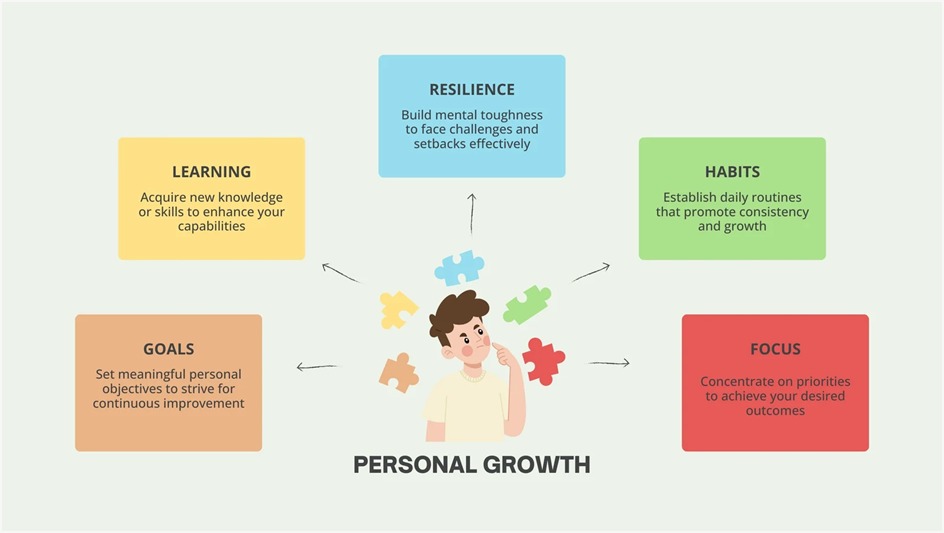Adaptability and Self-Improvement:
Successfully Navigating Life’s Transitions
Author - Rich
Founder of Your Transformations.
Certified Wellness Coach and Meditation Instructor.
Change is a fundamental and inevitable aspect of the human condition, serving as an essential element in the ontological progression of life. By recovering from setbacks and trying out new opportunities, individuals position themselves for self-improvement, fulfillment, and potentially unforeseen developments.
Understanding Resilience
Resilience entails the capacity to recover from unforeseen outcomes and to extrapolate novel ideas from these experiences. It represents not only the act of “bouncing back,” but also a deeper process of adaptation and transformation. A resilient mindset grants people the ability to perceive challenges as important lessons, maintain an optimistic perspective, and seek support from peers, family, or mentors. Fundamentally, resilience involves maintaining persistence in the face of obstacles.
Psychologically, resilience emphasizes the significance of embracing uncertainty and ambiguity as conditions for growth reflecting the idea that true transformation often unfolds through discomfort and the unknown. When individuals welcome change, they develop flexible emotions that promote thriving through unpredictable shifts.
The Concept of Reinvention
Reinvention can be defined as the intentional process of granting oneself the autonomy to explore novel pursuits or embark on alternative trajectories, whether in job or home life. It involves creatively responding to life’s flux, making intentional choices to evolve beyond current limitations or past identities. This process corresponds closely with theories of adaptive change and self-actualization, encouraging individuals to realign with their authentic values, interests, and aspirations. Reinvention is often fueled by resilience but demands courage to embrace the uncertainty of not knowing outcomes in advance. Embracing this ambiguity, the space where possibilities multiply redirects attention from rigid goals to ongoing discovery and the joy of becoming. By embracing reinvention, no matter how small, we open pathways to profound joy and personal growth.
Tips for Building Resilience and Reinventing Yourself
- Know Your Strengths and Values: Take time to reflect on what matters most to you. https://yourtransformations.com/wp-content/uploads/2025/08/Wellness-Map.pdf
- Welcome Change: Try to see change as an exciting chance to learn and grow, instead of something to fear.
- Break It Down: Set small, realistic goals and celebrate every step forward--big or small.
- Keep Learning: Stay curious and open.
- Reach Out for Support: You don’t have to go it alone!
- Exercise Self-Compassion: The process of change can be challenging, and encountering difficulties is a common experience. Approach yourself with empathy and comprehension.
- Enjoy the Journey: Embrace lifelong learning and keep your sense of wonder alive.
Some journeys really inspire and encourage us to build resilience and adaptability
- Dr. Viktor Frankl, a Holocaust survivor and psychiatrist, transformed profound suffering into a search for meaning, demonstrating how purpose can fuel resilience even in the darkest circumstances.
- Bethany Hamilton, a teenage surfer, survived a devastating shark attack that resulted in the loss of her left arm at age 13. Remarkably, she returned to surfing just 26 days later, adapting her technique and equipment, fueled by determination and faith. Her journey from survivor to professional champion exemplifies extraordinary resilience and courage in the face of physical and emotional trauma.
- Jessica Lynch, a former soldier and prisoner of war, endured severe injuries and captivity during the Iraq War. After multiple surgeries and a long recovery, she transitioned into a life of public service, education, and motivational speaking. Lynch's story highlights perseverance, strength, and the power of a positive mindset over decades of healing and reinvention.
- Vera Wang switched careers more than once, finding her true calling in fashion design and launching a world-famous brand in her 40s.
- J.K. Rowling didn’t let tough times stop her from writing the Harry Potter series, which enchanted readers around the globe.
- Steve Jobs made an incredible comeback at Apple, guiding the company to new heights after a period of change and innovation.
- Nelson Mandela exemplified the power of hope and forgiveness and was instrumental in South Africa's transition from apartheid to a democratic society. His leadership in the establishment of the Truth and Reconciliation Commission was instrumental in supporting national healing.
- Julia Child found her passion for cooking later in life, inspiring others to follow their dreams, no matter their age.
- Malala Yousafzai turned personal adversity into a global movement for education and equality, encouraging young people everywhere to use their voices.
To conclude,
Resilience and the ability to reinvent oneself are not fixed traits limited by one’s past; rather, they are capacities that can be cultivated and strengthened over time. By embracing flexibility, adapting to new circumstances, and allowing space for continual personal development, individuals have the potential to shape a life that genuinely reflects their evolving sense of self. This perspective fits with established theories of adaptive change and the pursuit of self-actualization. Each new phase offers an opportunity to investigate inner strengths, rewrite personal narratives, and discover contentment in the uncertainties that life presents.
Author - Rich
Founder of Your Transformations.
Certified Wellness Coach and Meditation Instructor.
